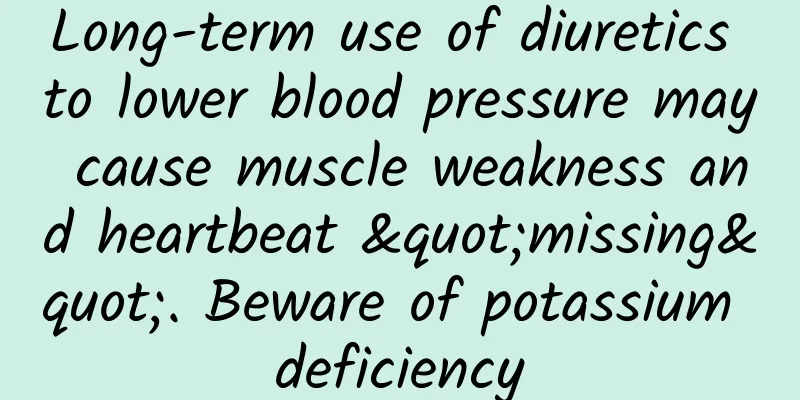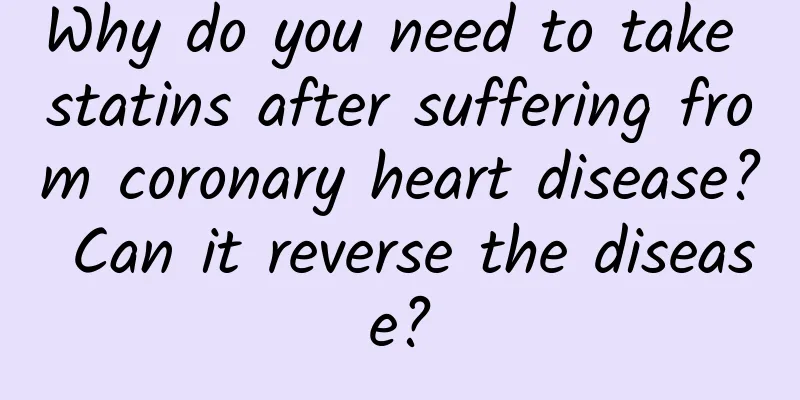Long-term use of diuretics to lower blood pressure may cause muscle weakness and heartbeat "missing". Beware of potassium deficiency

|
A friend of mine had been suffering from high blood pressure for 5 years. He took antihypertensive drugs regularly and his blood pressure was well controlled. But for a while, he always felt tired easily, had no strength in his body, felt anxious, and sometimes his heart would "miss a beat". After going to the hospital for a checkup, it was found that his blood potassium was low. After potassium supplementation, it returned to normal. The doctor told him seriously that he must pay more attention to his blood potassium level in the future, because severe hypokalemia can be life-threatening and may cause cardiac arrest. 1. Diuretics can easily lead to hypokalemia The reason for this patient's hypokalemia is that his antihypertensive medication contains hydrochlorothiazide, a diuretic that promotes the excretion of water and sodium, reduces blood volume, lowers the sodium ion level in the body, reduces the excitability of vascular smooth muscle cells, and ultimately has the effect of lowering blood pressure. The principle of thiazide diuretics is to inhibit the reabsorption of sodium ions and water in the primary urine by the renal tubules, thereby producing a diuretic effect. However, there is a sodium-potassium exchange mechanism in the renal tubules. When sodium ion excretion increases, some potassium ions will also be replaced and excreted in the urine, which may cause hypokalemia. 2. Potassium ions play an important role in the human body Potassium ions are widely distributed in the human body, mostly in muscle cells, and also in the nervous system. The role of potassium ions is to stimulate the movement of cells by forming a potential difference between the inside and outside of cells through the ion transport of cells and using their own positive charge. The human heart is mainly composed of myocardial cells, and potassium ions are an important element to maintain the work of myocardial cells. The normal level of human blood potassium is between 3.5 and 5.5 mmol/L, which maintains the normal excitability of the myocardium. Increased or decreased blood potassium will affect heart function. The death penalty adopted by my country is to inject a large dose of potassium chloride into the death row prisoner, causing high blood potassium and cardiac arrest. When blood potassium is too low, it will cause cardiac conduction disorders, and in severe cases, it will also cause cardiac arrest. 3. What are the symptoms of hypokalemia? 1. Muscle fatigue: Potassium ions play a role in maintaining muscle activity and normal nerve conduction function. When the potassium ion level drops, the function of nerves and muscles will also decline, and symptoms such as fatigue and muscle weakness will appear. Muscle spasms and pain may also occur, which are commonly known as "cramps" symptoms. 2. Heart "skipping beats": Low blood potassium levels can lead to abnormal cardiac conduction and easily induce arrhythmia. You will feel your heart beating wildly, with tachycardia or "skipping beats". 3. Indigestion: The peristalsis of gastrointestinal smooth muscles also requires the participation of potassium ions. When the body is in a low potassium state, gastrointestinal motility is inhibited, and symptoms of indigestion such as abdominal distension and decreased appetite will appear. The intestines lose sensitivity to the stimulation of feces, and symptoms of constipation will appear. 4. Blood pressure fluctuations: Potassium ions can counteract the blood pressure-raising effect of sodium ions. When the blood potassium level decreases, the sodium ion level increases relatively, which will lead to increased excitability of vascular smooth muscle cells, enhanced vascular contraction ability, and increased peripheral circulatory resistance, which manifests as blood pressure fluctuations. 4. Pay attention to potassium supplementation when taking diuretics for a long time Long-term use of thiazide diuretics can easily lead to hypokalemia, which is a threat to health. You must pay attention to daily potassium supplementation. You can eat more foods high in potassium, such as bananas, grapefruits, grapes, pineapples and other fruits, as well as green vegetables, potatoes, yams, kelp, lean animal meat and other foods. You can also choose "low sodium salt" when cooking, which uses potassium chloride instead of sodium chloride. If the potassium deficiency is more serious, potassium chloride tablets can also be taken orally. For people with normal renal function, oral potassium chloride is usually safe. However, it should be noted that if it is used in combination with the potassium-sparing diuretic spironolactone, or with antihypertensive drugs such as "pril" and "sartan" that have a potassium-raising effect, or for people with renal insufficiency, excessive potassium supplementation is prone to hyperkalemia, so it is necessary to monitor blood potassium and supplement potassium only when low potassium is confirmed. To sum up, potassium ions are very important to the human body. When using diuretics for a long time, you should be wary of hypokalemia and supplement potassium while monitoring blood potassium. When potassium supplements are needed, they must be used under the guidance of a doctor. If you have any questions about medication, please consult a doctor or pharmacist in time. I am pharmacist Huazi. Welcome to follow me and share more health knowledge. |
<<: Why does seaweed turn purple after being soaked in water? Does seaweed need to be washed?
>>: What are the benefits and effects of seaweed? Can eating seaweed help you lose weight?
Recommend
What is the best way to treat uterine prolapse?
What is the best way to treat uterine prolapse is...
Can I have an abortion at 10 weeks of pregnancy?
If a woman does not want a child due to some unex...
Nipple pain after menstruation for half a month
Premenstrual breast pain cannot be ignored. Menst...
Silver Age Health | As the temperature rises, do a good job in preventing and treating bedsores
There are many elderly people who cannot move fre...
How to conceive twins naturally
Many mothers want to have twins. This is mainly b...
Irregular menstruation, abnormal amount of leucorrhea
Not all vaginal discharge is a symptom of women. ...
How to prevent allergic rhinitis in autumn? Is allergic rhinitis closely related to heredity?
It is autumn now, the air becomes dry, and the te...
Syphilis early symptoms rash pictures
Sexual intercourse is basically a habit that many...
What to eat to double hcg value quickly
During pregnancy, HCG can stimulate the uterus an...
How to take care of itchy and red spots on pregnant women's belly
Now that you are pregnant, you should pay attenti...
Is there any vaginal discharge after menopause?
After menopause, female friends are also very cur...
Symptoms of pharyngitis in women
The symptoms of pharyngitis in women are the same...
Dandruff during pregnancy
In the early stages of pregnancy, many women will...
What is the reason for early menstruation and less menstrual volume?
The disease of early menstruation and small amoun...
How are uterine fibroids formed?
Many people are not very clear about how small ut...









